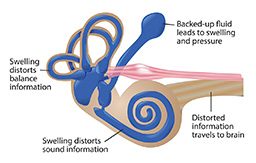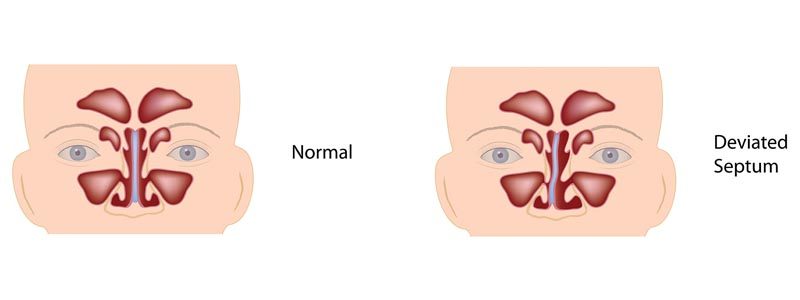Your ears and ability to equalize may be affected by various diseases. In this section, we have provided information about two conditions divers often ask about: Meniere’s disease and deviated nasal septum. If you have questions about specific conditions that are not highlighted in this book, do not hesitate to contact the DAN Medical Information Line at +1 (919) 684-2948.
In this chapter, you’ll learn about:
Meniere’s Disease
Meniere’s disease is a disorder involving recurring episodes of vertigo, which may be associated with vomiting, fluctuating hearing loss, ringing in the ears (tinnitus) and a sensation of increased pressure in the ear.

This chronic condition affects the inner ear. It results in vertigo and hearing dysfunction. A disabling episode of vertigo may involve severe nausea and vomiting. In addition, Meniere’s disease can muffle or impair hearing. Individuals may also experience a sensation of increased pressure in the ear. Migraine headaches have also been linked to this condition.
Management
Treatment focuses on symptom management. Medications are used to control the vertigo and associated nausea and vomiting. Diuretics are sometimes used to help regulate the excess volume of endolymph (fluid contained in the inner ear) that is associated with Meniere’s disease.
An ENT physician consultation is recommended as surgical procedures may help achieve relief. For a referral in your area, email , or call the DAN Medical Information Line at +1 (919) 684-2948.
Fitness to Dive
This condition is variable. It may spontaneously resolve or progress to involve the other ear. If you are at risk of experiencing disabling symptoms such as vertigo, disorientation, nausea or vomiting, you should not dive; should these symptoms occur underwater, they may lead to panic, choking and even drowning. In addition, these symptoms may be confused with dive-related injuries such as inner-ear barotrauma or inner-ear decompression sickness.
Deviated Septum
A deviation of the wall separating the two nostrils that may lead to obstruction of the nasal passages and sinuses is a deviated septum.
The nasal septum is the wall that separates the two nostrils. When the septum is displaced or curved, it is known as a deviated septum. Generally this condition is of little or no consequence and may go unnoticed; affected individuals may experience difficulty equalizing. A deviated septum may be present at birth (congential disorder) or result from trauma to the nose. It is often discovered during a routine physical exam. This condition has been linked to sinusitis as well as barotrauma (sinus and middle ear).

Treatment
Decongestants may provide some relief. Surgical correction (septoplasty) is typically reserved for those with symptoms such as snoring, nasal obstruction, recurrent sinusitis or sleep apnea.
Fitness to Dive
There is no contraindication to diving with an asymptomatic deviated septum. If recurrent infections or difficulty equalizing occurs, an ENT consultation is suggested. For a referral in your area, email , or call the DAN Medical Information Line at +1 (919) 684-2948.
